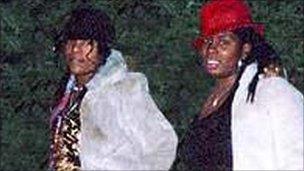Marcia Shakespeare's fears over West Midlands police cuts
- Published
The mother of one of the two girls killed in the notorious new year shootings in Birmingham is warning that the legacy of the murders is at risk because of police funding cuts.
Marcia Shakespeare said that since her daughter Letisha, 17, and 18-year-old Charlene Ellis were killed by gangsters in Aston in 2003, violent crime and anti-social behaviour had fallen.
The pair were were shot outside a party in a botched gang attack on 2 January.
But now Ms Shakespeare fears the focus on fighting street crime could be lost as youth projects are cut along with some front-line police teams.
"Some of the structure is still in place but a lot has been lost because of funding cuts - it is a major problem.
"When Letisha and Charlene were killed it was bad then and it was a turning point for Birmingham and that turning point needs to stop at the point where it is and not be lost through lack of funding and resources."
Four men were convicted of the girls' murders in March 2005.
Familiar police face
After their deaths, it was decided to base more than 20 West Midlands Police officers in the schools in the heart of the city's gun and gang areas, like Aston and Lozells.
At first it was seen as a heavy-handed measure but having a known police face in and around the school corridors meant that children growing up had a different perspective on the uniformed officers, and if they or their parents had problems there was a familiar person who knew them and would take an interest in local issues.
But since the announcement of 20% cuts in the police budget, 26 police posts at the schools have been axed and the officers put back on normal duties.

The girls died outside a hairdresser's in January 2003
Last week, it was revealed that more than 2,000 jobs are likely to go at the force by 2015, including 1,250 officers.
The force said it is facing a £126m reduction to its budget over those four years.
One senior teacher at Holte School in Lozells is dismayed at the removal of police officers from schools.
Deputy head Gordon Higginson said he is concerned about what the effect might be in the fight against anti-social behaviour.
"The parents felt some comfort knowing that there was always a police officer on hand to help, advise and if necessary deal with issues," he said.
"Taking that away has been unfortunate; certainly the reduction in street crime and robbery and youth crime was a really positive effect and it remains to be seen how that changes.
"But certainly we have felt the difference in terms of contact and regular communication with the police since the police officers were pulled from schools and I think that's common from any schools who had a police officer."
Anti-social behaviour has fallen in many parts of the city, in some areas by as much as 30%, while gang-related murders in Birmingham fell from 27 in 2002-3 to four by 2008.
Some older gang members were even sending messages from prison saying that gang violence was a waste of time.
But there are fears that those older heads have been replaced by teenage figures not frightened of carrying weapons and discharging guns.
Ch Supt Phil Kay from West Midlands Police said he is using his officers more intelligently and effectively.
"Schools-based officers and officers spending time in schools is still a very important part of what we do.
"In fact, I recently received an email from a local head teacher thanking me for some work that my officers did in a primary school.
"So engaging with young people, diverting them from crime and anti-social behaviour, remains really important to us."
- Published21 July 2011
- Published15 November 2010